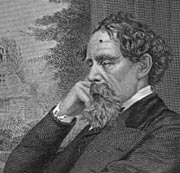Reading Comprehension - Comprensión de Lectura
Date:
 Charles John Huffam Dickens (February 7, 1812 - June 9, 1870), pen-name "Boz", was an English novelist of the Victorian era.
Charles John Huffam Dickens (February 7, 1812 - June 9, 1870), pen-name "Boz", was an English novelist of the Victorian era.
The popularity of his books during his lifetime and to the present is demonstrated by the fact that none of his novels have ever gone out of print.
Dickens' writing style is florid and poetic, with a strong comic touch. His satires of British aristocratic snobbery — he calls one character the "Noble Refrigerator" — are wickedly funny. Comparing orphans to stocks and shares, people to tug boats, or dinner party guests to furniture are just some of Dickens' flights of fancy which sum up situations better than any simple description could.
The characters themselves are amongst some of the most memorable in English literature. Certainly their names are. The likes of Ebenezer Scrooge, Fagin, Mrs. Gamp, Micawber, Pecksniff, Miss Havisham, Wackford Squeers and many others are so well known they can easily be believed to be living a life outside the novels, but their eccentricities do not overshadow the stories. Some of these characters are grotesques; he loved the style of 18th century gothic romance, though it had already become a bit of a joke.
One character most vividly drawn throughout his novels is London itself. From the coaching inns on the out-skirts of the city to the lower reaches of the Thames, all aspects of the capital are described by someone who truly loved London and spent many hours walking its streets.
Most of Dickens' major novels were first written in monthly or weekly installments in journals such as Household Words and later collected into the full novels we are familiar with today. These installments made the stories cheap and more accessible and the series of cliff-hangers every month made each new episode more widely anticipated. Part of Dickens' great talent was to incorporate this episodic writing style but still end up with a coherent novel at the end. The monthly numbers were illustrated by, amongst others, "Phiz" (a pseudonym for Hablot Browne).
Among his best-known works are Great Expectations, David Copperfield, Oliver Twist, Nicholas Nickleby, A Tale of Two Cities, and A Christmas Carol. David Copperfield is argued by some to be his best novel — it is certainly his most autobiographical. However, Little Dorrit, a masterpiece of acerbic satire masquerading as a rags-to-riches story, is on a par with the very best of Jonathan Swift and should not be overlooked.
Dickens' novels were, among other things, works of social commentary. He was a fierce critic of the poverty and social stratification of Victorian society. Throughout his works, Dickens retained an empathy for the common man and a skepticism for the fine folk.
Dickens was fascinated by the theatre as an escape from the world, and theatres and theatrical people appear in Nicholas Nickleby. Dickens himself had a flourishing career as a performer, reading scenes from his works. He travelled widely in Britain and America on stage tours.
Much of Dickens' writing seems sentimental today, like the death of Little Nell in The Old Curiosity Shop. Even where the leading characters are sentimental, as in Bleak House, the many other colourful characters and events, the satire and subplots, reward the reader. Another criticism of his writing is the unrealistic and unlikeliness of his plots. This is true but much of the time he was not aiming for realism but for entertainment and to recapture the picaresque and gothic novels of his youth. When he did attempt realism his novels were often unsuccessful and unpopular. The fact that his own life story of happiness, then poverty, then an unexpected inheritance, and finally international fame was unlikely shows that unlikely stories are not necessarily unrealistic.
All authors incorporate autobiographical elements in their fiction, but with Dickens this is very noticeable, particularly as he took pains to cover up what he considered his shameful, lowly past. The scenes from Bleak House of interminable court cases and legal arguments could only come from a journalist who has had to report them. Dickens' own family was sent to prison for poverty, a common theme in many of his books, in particular the Marshalsea in Little Dorrit. Little Nell in The Old Curiosity Shop is thought to represent Dickens' sister-in-law, Nicholas Nickleby's father is certainly Dickens' own father and the snobbish nature of Pip from Great Expectations is similar to the author himself.
At least 180 movies and TV adaptations have been based on Dickens' works.
This article is licensed under the GNU Free Documentation License. It uses material from the Wikipedia article "Charles Dickens". You can explore more on the Wikipedia website. The text and the images are used here only for educational purposes.
Questions about the text
You can download some books by Charles Dickens
for free in our Free Books section
Más ejercicios para practicar inglés
Libros recomendados (Ad)
Intermediate English Reading and Comprehension
Este libro contiene diversas lecturas con ejercicios para estudiantes de nivel intermedio. Es ideal para incorporar vocabulario, mejorar la comprensión y aprender estrategias de lectura. Ver más
Fast Forward Reading
Diseñado especialmente para estudiantes de nivel intermedio y avanzado, este libro incluye técnicas prácticas para leer más rápido, recordar más y comprender mejor cualquier texto. Ver más
English Reading: 10 Passages for English Learners
Un libro práctico con 10 lecturas para estudiantes intermedios, con ejercicios de comprensión que ayudan a prepararse para exámenes internacionales como TOEFL, TOEIC, IELTS. Ver más
Descubre el origen de las palabras en
The Story behind the Words

Practica inglés leyendo cuentos cortos y sencillos, con el vocabulario traducido. ¡Es fácil y divertido!
Cuentos en inglés

Great Tales from English
History
The truth about King Arthur, Lady Godiva, Richard the Lionheart, and more!



